All the most interesting things in the lives of famous people. Funny stories from the lives of famous people
Greetings to new and regular readers of the site! Friends, all people are always interested in mysticism, mysterious stories from life, unsolved secrets...
Very often, on TV, in magazines, in newspapers and on the Internet, we hear, see, read success stories of different famous personalities. These stories are always filled with struggles, problems, ups and downs.
Sometimes you can stumble upon strange, even frightening, mysterious stories from the lives of great people and the lives of “stars”.
Mysterious stories from the lives of famous people
Ernest Hemingway
For example, everyone knows greatest writer of his time, Ernest Hemingway. Just like his work, the tragic life itself is known and no less tragic death writer. Hemingway was a man who personified courage, the fight against danger, the confrontation of death and the constant struggle with oneself and one's character.
However, not everyone knows that the tragic death of the writer was “prophesied” to him as a child. When the writer was still a child, he was given a gun.
The boy was so happy that he ran to show off, playing with the gun. An Indian saw a joyful boy. Noticing a gun in his hands, he said: “Be careful guy, weapons tend to turn on their owner”….
Many years later, old man Hemingway shot himself with the same gun, his favorite gun that was given to him.
This case can be considered a coincidence. Or you can, referring to the power and knowledge of the Indians, believe that the weapon really turned on its owner, depriving him of his life. And readers - one of their main idols and favorites, Papa Ham...
Film "Viy"
In addition to writers, mysticism also occurs in the lives of actors. So, everyone knows the film “Viy”, which was based on the work of Gogol. People who have read the book or watched the film know that it is literally “stuffed” with mysticism and otherworldly forces.
Natalya Varley in the film "Viy"
These sinister forces, in addition to the film, according to the actors and screenwriters, did not leave them behind the scenes.
A whole series of things happened on the set mystical events, as if someone was trying to stop the process. Actress Natalya Varley, who played main role, I was very sick for a very long time. Although she had no health problems before.
After the film, she did not act for a long time; the cinema seemed to have turned its back on her. Among other troubles, she lost her husband. During the filming of the main scenes that took place in Ukraine, it burned down at night. old church, involved in the filming.
In addition, as the actress says, she took the recording of the film with her while traveling by sea. However, she never managed to watch it. Every time she tried to turn it on, a violent storm began.
Film "The Master and Margarita"
There are rumors about the “curse” of Bulgakov’s novel “The Master and Margarita”, where one of the main characters is the devil. The series “The Master and Margarita” directed by Vladimir Bortko was released in 2005.
Accidents plagued the filming throughout. Many actors refused to film, but of the actors who decided to star in the film, 18 are no longer alive:
- October 2, 2005 - Alexander Chaban, who played the investigator, disappeared before the premiere. Found dead in his apartment. The circumstances of death are unknown.
- September 28, 2006 - actor Pavel Komarov, who played the thief on the pier, died.
- December 27, 2006 - 67-year-old Stanislav Landgraf, who played the critic Latunsky, died.
- April 27, 2007 - died National artist USSR Kirill Lavrov, who played Pontius Pilate.
- April 27, 2007 - Evgeniy Merkuryev (accountant) fell through the ice while fishing and died.
- January 3, 2008 - Alexander Abdulov (Koroviev) died of lung cancer at the age of 54.
- April 7, 2008 - Andrei Tolubeev, who voiced Aloysius Mogarych, died.
- January 25, 2009 - actor Yuri Oskin (doorman Nikolai) passed away.
- December 23, 2009 - Galina Barkova, who played the fruit seller, died.
- February 25, 2010 - the performer of the role of Ivan Bezdomny, Honored Artist of Russia Vladislav Galkin, was found dead in his own apartment. He was only 38 years old.
- April 20, 2010 - Valentina Egorenkova, who played a nurse in a mental hospital, died.
- August 20, 2010 - Stanislav Sokolov, secretary of Pontius Pilate, died.
- August 11, 2011 - Mikhail Surov, who starred in the episode, died tragically in a car accident.
- May 10, 2012 - the young actor Stanislav Pryakhin, who played a pickpocket, died of leukemia.
- November 11, 2012 - from lung cancer Ilya Oleinikov, who played the role of financial director of the Variety Rimsky, died at the age of 65.
- March 30, 2013 - Valery Zolotukhin (Nikanor Ivanovich Bosoy) died from an inoperable brain tumor.
- April 5, 2013 - Dmitry Poddubny, an NKVD agent, died in the series, in the series he investigated the disappearance of people from a bad apartment.
- In May 2014, Stanislav Fesyunov, the doorman of the Torgsi store, passed away.
Superman movie
Mysterious stories from the lives of famous people are known Hollywood actors who played the roles of superheroes we know and love. For example, the role of the superman Superman turned out to be unsuccessful for most actors. After the role, they either died during tragic circumstances, or ended up forgotten by all the producers and did not film again.

Christopher Reeve as Superman Superman
Superman George Reeves was found with a bullet in his head days before his wedding. It is still unclear whether it was murder or suicide.
The story of another Superman performer, Christopher Reeve, is even sadder. He fell from his horse before dying. He spent several years paralyzed in wheelchair. Margot Kidder, who played the superhero's girlfriend in the same film, went crazy...
Is this mysticism, or just the imagination of actors with the help of which they earn popularity, no one knows for sure. But after a detailed study of these cases, the idea is imposed that some forces, other than human ones, still exist in this world.
Dear readers, what do you think, is this a coincidence or something else? Leave comments on the article " Mysterious stories from people's lives." Thank you!
The most frank...
I myself am not a fan of such articles, but (alas!) the 21st century has changed our idea of what is “interesting.”
Napoleon Bonaparte (1769-1821), French Emperor
Napoleon was officially married twice and had several dozen famous love affairs with women. However, some of his habits indicated that he himself may have been a latent (hidden) homosexual. Napoleon not only did not prosecute his soldiers and officers for homosexuality, but also refused to take any measures to tighten laws against homosexuality in France. He loved to caress his soldiers and often chose his adjutants and assistants who were young and feminine. One of them, Baron Gaspard Gurgar, was Napoleon's personal orderly for 6 years. Terribly jealous by nature, he was very sensitive to any signs of attention from anyone to “Her Majesty,” as he always called Napoleon. And indeed, Napoleon was not at all distinguished by his masculine appearance: his height was 157 centimeters, his hands and feet were very small, his soft, slightly rounded chest, which many women would envy, the almost complete absence of hair on his body and, finally, the completely insignificant size of his genitals. Alas, the emperor ceased to be interested in sexual relations when he was only 42 years old, since he became completely impotent...
Hans Christian Andersen (1805-1875), Danish writer
Andersen's biographers unanimously claim that he never had sexual relations with either women or men, although, of course, ordinary physical desires arose. One can hardly talk seriously about his homosexuality. However, some personality traits of the great storyteller are suggestive. Tall, thin, with blue eyes and disproportionately long limbs (passers-by called him a “stork” or a “lamppost”), Andersen often suffered from depression, was a very vulnerable, touchy, painfully timid and shy person. Fearing death from fire, he carried a rope with him everywhere; fearing that he would be buried alive, he asked his friends to cut one of his arteries before putting him in the coffin; when he was sick, he left a note on the table by the bed: “It just seems like I’m dead”... It’s not surprising that Hans was not popular with women. By the way, in his youth Andersen worked at a factory, where he was often embarrassed by the dirty jokes and dirty jokes of the workers on the shop floor. Naturally possessing a magnificent soprano, he loved to sing right in the factory - until the workers pulled down his pants to make sure whether he was a boy or a girl...
Richard Wagner (1813-1883), German composer
Having married at the age of 23, Wagner was heterosexual, and yet one of his scandalous “gay” relationships is known - an affair with the 18-year-old King Louis II, who admired Wagner’s music and provided the composer with housing and money. The homosexual king was madly in love with Wagner and even in his letters called him nothing more than “my beloved” and “the love of my soul.” As a sign of gratitude, Wagner spent hours talking with the king about art and music, or simply sat next to him for a long time in reverent silence. It is not known whether anything more happened between them, but these meetings suggest that Wagner was not indifferent to the king. In any case, the age difference (Wagner was 50 years old) and the fact that Wagner was then living with his next mistress Cosima von Bülow (the daughter of his friend Franz Liszt) were not an obstacle.
Pyotr Ilyich Tchaikovsky (1840-1893), Russian composer
Although Tchaikovsky experienced a series of painful farewells to women to whom he was closely attached throughout his life, many of his contemporaries were aware of his homosexuality. The side of yourself hidden from prying eyes sex life he himself called "Z". Tchaikovsky used this designation in his diary and letters to his brother Modest. In the diary there is, for example, the following entry: “Z is tormenting me today as never before.” Another entry reads: “Completely exhausted, not just by Z, but by the fact that she’s inside me.” It is impossible to accurately name all of Tchaikovsky’s homosexual partners, since he carefully hid information about them, fearing exposure. However, two of them are known. Tchaikovsky repeatedly and often secretly traveled with his favorite student at the conservatory, Vladimir Shilovsky, and even dedicated two of his own to him. early plays for piano. The second was Tchaikovsky's nephew Vladimir (Bob) Davydov. In the composer's diary you can read: “R., how beautiful Bob is.” All his life Tchaikovsky suffered from neurasthenia. The disease first appeared in 1848, when governess Fanny Durbach left the Tchaikovsky family. Even more ordeal For 14-year-old Peter it was the death of his mother. All this, combined with homosexuality, made it almost impossible for him to have normal relationships with women. He tried to establish such a relationship with Desiree Artaud, a French opera singer, whom he met during her tour in Russia in 1868. Tchaikovsky fell passionately in love with her, and they even got engaged. However, one of his friends suggested that he might find himself in the shadow of Desiree, who was widely known. These fears were transmitted to Tchaikovsky, and he decided to postpone the wedding, and in the meantime Artaud married opera singer from Spain. Upon learning of this, Tchaikovsky was simply crushed. In 1877, he married his student from the conservatory, Antonina Milyukova. In her letters, Antonina swore to him eternal love and expressed a strong desire to marry him, despite Tchaikovsky’s own admission that he is a homosexual. Obviously, Antonina was a narrow-minded person: she could not name a single work of her husband and imagined that all the men around were trying to seduce her. Tchaikovsky married her out of pity, but lasted only three months life together, after which he escaped and made an unsuccessful attempt to commit suicide, standing for several hours neck-deep in the water of the Moscow River on a cold October night in the hope of getting pneumonia. He later tried to convince Antonina that he was cheating on her in order to get a divorce, and even thought about killing her. In 1881, Tchaikovsky learned that his wife was cheating on him, but did not demand a divorce, fearing that she might tell about his sexual preferences. Antonina began to cheat on him left and right, and even gave birth to several children from different lovers... No less weird relationship Tchaikovsky developed a relationship with Nadezhda von Meck, a wealthy widow who fell in love with Tchaikovsky’s music and was his patron for 14 years. However, they communicated only through letters, often of a rather intimate nature, amounting to as many as 3 volumes. In 1890, von Meck suddenly broke off correspondence, and the reason for their breakup remained unknown. Three years later, when Tchaikovsky was dying in his home in St. Petersburg, he often spoke her name - as his brother Modest admitted, “in a reproachful tone.”
Paul Verlaine (1844-1896) and Arthur Rimbaud (1854-1891), French poets
Verlaine was only child in the family and throughout his life he remained his mother’s favorite - weak, weak-willed and irresponsible, demanding and contradictory. He later said that his sensuality “awakened” when he was 12 or 13 years old, but his appearance and sloppiness aroused antipathy rather than any warm feelings. He had a wide, flat face with small eyes almost hidden under thick eyebrows. Children teased him, and one of the teachers once said that Verlaine looked like some kind of degenerate criminal. At school, Paul was always attracted to boys from more junior classes, with whom he struck up a “warm friendship.” However, he was not entirely homosexual. At about the age of 17, Paul began using the services of prostitutes and drinking absinthe. After a long period of cheerful dissolute life, Verlaine met a 16-year-old girl, Mathilde Mate, who seemed to him an example of virgin purity. She admired his poetry and did not consider him ugly. For 10 months after the engagement, Verlaine was happy, but the marriage quickly sobered him up: the “beauty” turned out to be empty and vain, and he turned from a “prince” into a “monster” again. Paul began to drink a lot, he began to have outbursts of wild aggressiveness (once, in a rage, he even threw his newborn son so that he hit the wall). In the end, he simply ran away from home with 17-year-old poet Arthur Rimbaud. Matilda divorced Verlaine. Rimbaud was a "boy genius" French poetry, beautiful, good beyond his years those who know life a young man who wrote unusually original poetry. At the same time, he was an incorrigible bully, a cruel pervert and a sadist. His theory of the need to experience all forms of love, suffering and madness in the name of the search for poetic "truth" made him a desirable sexual prey for Verlaine. First, Rimbaud sent Verlaine his poems and a letter of recommendation, and then came to Paris - tattered, dirty and penniless. At first, Verlaine settled Rimbaud in the house of his wife’s relatives, where he himself then lived, and later began to arrange for him to stay with all his friends in turn. One of them, a homosexual musician, instilled in Rimbaud an addiction to hashish. Day and night both poets had fun and feasted, and in public they behaved deliberately provocatively, showing each other signs of love and attention. Alone, Verlaine and Rimbaud spent the “nights of Hercules,” engaging in what they themselves called “tiger love.” Of the two, Rimbaud was clearly the dominant, active partner. Verlaine, who considered himself a feminine man, looking for love and defense, was simply fascinated by this “young Casanova” with his irresistible combination of beauty, genius and violence. Rimbaud once slashed Verlaine with a knife to have fun and at the same time test his power over his older comrade. He also constantly mocked Verlaine's "marital respectability", and as a result, in July 1872, Verlaine left his family and left France with Rimbaud. In all likelihood, Verlaine's mother gave them financial assistance, because she was jealous of Verlaine and Matilda. Verlaine and Rimbaud traveled for almost a year, and this year became the happiest in Verlaine’s life, which he later recalled “intensely, with all his being.” First they traveled around Belgium and then moved to London, where they began to live in the cheapest hotels. This was a period of increased creative activity for Verlaine. However, soon the relationship between them began to deteriorate. They quarreled more and more often, as Rimbaud was tired of being constantly dependent on his older fellow poet. Unable to bear the tense situation any longer, Verlaine suddenly left London in July 1873 and went to Brussels. He sent letters notifying that he was going to commit suicide to everyone who might be concerned, including himself. ex-wife, and began to wait for who and when would save him. Verlaine's mother was the first to rush in, followed by a very aggressive Rimbaud. During an emotional, drunken argument that escalated into an argument, Verlaine grabbed a pistol (with which he was planning to commit suicide) and shot at Rimbaud, wounding his hand. Fearing another attack, Rimbaud contacted the police, and Verlaine was arrested. Verlaine was sentenced to two years in prison for attempted murder. There was a small scandalous episode - during a medical examination, evidence of Verlaine's participation in homosexual sexual acts was found. Verlaine was released in January 1875: for exemplary behavior he was released for six months ahead of schedule. He immediately found Rimbaud and again began to solicit his friendship. He responded to Verlaine's advances by avoiding him, and once even left him. ex-friend unconscious near the road. Rimbaud soon abandoned poetry and became an indefatigable adventurer. He died of cancer in 1891, at the age of 36. Verlaine held no grudge against Rimbaud and until his last days considered the years spent with him to be the intellectual, emotional and physical pinnacle of his life. The satisfaction he received from communicating with Rimbaud was so deep and intense that it bordered on pain. After the death of his mother, life no longer pleased Verlaine: if he was not being treated in some hospital, he spent time with two aging, dirty and sloppy prostitutes - Philomena Boudin and Yuzhen Kranz. They satisfied his sexual instincts and stimulated his masochism by quarreling and swearing with him, and sometimes beating him. They greedily snatched sheets of new poems from his hands and immediately ran to sell them... Verlaine’s funeral was led by Yuzhen wearing a widow’s mourning bandage. Drinking with money earned from selling counterfeit literary souvenirs quickly led her to an early grave.
André Gide (1869-1951), French writer, Nobel Prize laureate
Andre Gide was born in Paris and was the only child of a wealthy and respected family. His father, a famous lawyer, died when the boy was 11 years old. Andre's mother was a woman of very strict morals. At school, Andre was never particularly successful. One day he was kicked out of class because he started masturbating right in class (!) (it seemed to him that he would be able to do this without the teacher and other students noticing). The mother, crying, took him to the doctor, and he threatened the boy that he would castrate him if anything like that happened again. Nervous and constantly worried about something, 13-year-old Andre fell in love with his 15-year-old cousin Madeleine Rondeau, whom he idolized for the rest of his life. However, at the age of 25, he declared that he was a pederast, a man whose sexual desires could only be boys and young men. After the death of his mother, Andre “married” Madeleine (there was never sexual intimacy between them during the marriage). Until the end of his life, he was torn apart by the contradictions between the sensual and spiritual principles of his personality, an attempt to resolve which was his writing activity. Despite the fact that Andre Gide had a huge influence on the literature of his time, the church banned his works, which shocked readers and deeply offended his wife. Fame and honors fell on the writer only in 1947, when he was awarded Nobel Prize in Literature, and was awarded a Doctorate by Oxford University. Andre had his first sexual experience at the age of 23 after meeting a 14-year-old Arab boy named Ali while in Tunisia. When Ali offered himself to Andre somewhere right in the dunes not far from the hotel, Andre at first pretended to be hesitating and could not decide to contact him, but then happily accepted this offer. Later, he tried to “bring himself back to normal” by starting a relationship with a 16-year-old prostitute Mariam, who, by the way, looked very similar to a boy. Andre wrote that while in bed with Mariam, he imagined that he was lying with her younger brother, who was “black and thin, just a real devil.” The next year, Gide went to Algeria, where he met the famous “blue” couple - the writer Oscar Wilde (1854-1900) and his lover Lord Alfred Douglas. One day Wilde brought him to a hotel young musician named Mohammed and introduced him to Andre. Until the end of his life, Jide recalled the night spent with Mohammed as highest point sexual pleasure. He later wrote: “When Mohammed finally left, I was still in a state of joyful excitement for a long time. With his help, I reached the peak of sexual satisfaction five times, and now I lay and experienced these sweet sensations again and again.” There, in Algeria, Andre became very attached to his 15-year-old servant Atman. He called him “the black pearl” and even wrote to his mother in Paris that he wanted to bring Atman with him to France so that he would “help them around the house.” Madame Gide did not want to hear about it, and for a month they fought, sending each other increasingly angry letters. In the end, the mother gave her son an ultimatum, and he reluctantly gave in. However, four years later, Andre came to Algeria again and still took Atman to Paris... His mother’s crude attempts to suppress his sexuality as a child led to the fact that any manifestation of sensuality began to cause Andre a feeling of deep guilt. The mother, by her own example, tried to convince her son that " good women“There are never sexual desires. And Andre later recalled one of his first homosexual relationships this way: “I felt like a huge vampire sucking on a corpse.” After the death of his mother, he thought long and painfully, trying to understand and unambiguously define the sexual side of his personality. Attempts at sexual intimacy with women failed one after another, sexual contacts with young men brought more and more satisfaction. Finally, Andre decided to see a doctor and honestly talk about his sexual tastes and affections. The doctor examined him, listened to his revelations and a statement that he Andre considers himself a “hopeless pervert” and gave him the following optimistic advice: “Get married. Marry without any fear. You very quickly realize that everything else exists only in your imagination." Andre's only more or less successful heterosexual relationship, which resulted in the birth of a daughter, began only at the age of 46 with Elisabeth van Rysselberghe, the daughter of his old friend. But even after this, the basic essence of Andre Gide's personality remained homosexual.
Vaslav Fomich Nijinsky (1889-1950), Russian ballet dancer, choreographer
Nijinsky was born in Kyiv into a family of Ukrainian dancers and began dancing early, although he was “a clumsy and slow-thinking child.” His mother convinced him that he should study ballet, because a career in this art form promised money and fame. In the spring of 1907, Vaslav Nijinsky graduated from the Imperial Ballet School in St. Petersburg and became a soloist Mariinsky Theater. In 1909, he met the impresario Sergei Diaghilev, and his performance in Paris with Diaghilev's Russian Ballet troupe became a real sensation. In 1911, Nijinsky was expelled from the Mariinsky Theater troupe for not fully donning his stage costume when appearing on stage in a play, but he was immediately offered a place in the Russian Ballet. Abandoning traditional methods classical ballet, Nijinsky brought to brilliance the execution of jumps, during which he seemed to float above the stage. In 1908, Vaclav, a naive and wonderful young man, struck up a close friendship with 30-year-old Prince Pavel Dmitrievich Lvov, who became his first lover. At their first meeting, Nijinsky liked the tall, blue-eyed, handsome Lvov. The prince introduced the young man to intoxicating pleasures nightlife and gave him his first experience of homosexual relations. Lvov was generous and generous and managed to win the heart of his young lover. However, after a few months, he managed to get tired of Nijinsky, whom he called another “toy,” and stopped contacting him. True, before they parted, Lvov introduced Nijinsky to Sergei Diaghilev, who was 17 years older than Nijinsky. Sergei Pavlovich Diaghilev (1872-1929) was known as a Russian theater and artistic figure, co-editor of the World of Art magazine, organizer of exhibitions and concerts. Diaghilev never tried to hide the fact that he was a homosexual. The only sexual contact in his life with a woman, his 18-year-old cousin, gave Diaghilev only a venereal disease. Nijinsky became Diaghilev's lover, completely losing any independence. The impresario controlled the professional and personal life Nijinsky, insisted that he should not sleep with women under any circumstances, claiming that this would negatively affect his performances. Diaghilev managed to convince Nijinsky that he was right so much that Vaclav refused the proposal of Isadora Duncan herself (he met her in 1909 in Venice), who dreamed of having a child with him. Diaghilev repeatedly invited Nijinsky to have group sex with him and another of his lovers, but Nijinsky always refused such offers. By the age of 23, Vaclav felt old enough to cease being just one of Diaghilev’s “boys”. In September 1913, on the way to tour in South America he became engaged to the 23-year-old coquette Romola de Pulski, daughter of the Hungarian actress Emilia Marcus, and she became his wife that same year. Upon learning of Nijinsky's engagement, Diaghilev was stung. He took revenge on his ex-lover, firing him from the Russian Ballet and refusing to answer his letters. Nijinsky was a brilliant dancer, but a bad businessman, and his own troupe, after a year-long tour of Europe and America, suffered financial failure. Then misfortunes rained down one after another. During the First World War, Nijinsky was accused of spying for Russia, he was captured and imprisoned in Austria-Hungary. He appeared on stage only in 1916. Soon after his marriage, Nijinsky, with Romola's permission, entered into a sexual relationship with another of his admirers, Duchess Durcal, which he later greatly regretted. Romola had two daughters from Nijinsky, but soon after the birth of the first in 1914, Diaghilev entered his life again. Romola tried in every possible way to prevent this and even sued Diaghilev so that he would pay Nijinsky 500,000 francs for performances in the Russian Ballet. The case was won, but Diaghilev never paid this amount. Romola pulled Nijinsky with all her might in one direction, and Diaghilev, not yielding to her in any way, in the exact opposite direction. Since 1919, Nijinsky, unable to dance and give vent to his feelings, fell into a state of quiet insanity. He suffered from insomnia, persecution mania, schizophrenia and depression, and most he spent the last 30 years of his life in psychiatric hospital in Switzerland. Nijinsky's diaries, which he began in 1918-1919, were first published in England in 1936, but only in 1995 a new edition was published in France - "Notebooks", the confession of a soul standing on the edge of an abyss, its farewell cry before plunging into darkness . Until now, Nijinsky’s diaries were known only in a cleaned, smoothed and ennobled version, since they were subjected to severe “censorship” by his wife Romola: erotic passages, “indecent” pages where the patient talks about urine and excrement were removed, manic repetitions were removed, completely Dr. Frenkel, Nijinsky’s doctor and his wife’s lover, disappeared, the name of Prince Pavel Lvov was not mentioned, Nijinsky’s poems were thrown out, especially those where physical love depicted as a divine act, and God is likened to the male phallus.
Federico Garcia Lorca (1898-1936), spanish poet and playwright
In the early 20s, Lorca studied in Madrid. In the Student Residence (the hostel of Madrid students, which they called Resi for short), 150 young students lived in an atmosphere of European freethinking and youthful rebellion. It was here that the young poet met and became friends with Salvador Dali (1904-1989) and Louis Buñuel (1900-1983), who later became famous surrealists: Dali as an artist, and Buñuel as a director. Buñuel, who settled in Resi in 1917, was handsome, strong and excellently built, but despite his excellent appearance, he constantly played sports and worked hard on his body. Subsequently, he admitted that he improved himself and demonstrated his masculinity on the sports field in order to prove the legitimacy of too frequent visits to brothels, as well as trying to get rid of cowardice. Louis was heterosexual. Moreover, the need to confirm his fighting qualities pushed him to vile deeds: he participated in the beating of homosexuals in public toilets. However, oddly enough, youthful outbursts of homophobia did not prevent him from being friends with the homosexual Lorca... Lorca, who had lived in Resi since 1919, returned here in 1923 after an 18-month absence, during which his friends and admirers managed to he'll miss you. In 1918, with the financial support of his father, Lorca published his first book, “Impressions and Landscapes,” and in 1920 he staged a play, which, unfortunately, was not accepted by the Madrid public, but “The Book of Poems” (1920) received excellent reviews. Of course, Salvador Dali (he came to Resi as an 18-year-old boy), with his pathological timidity and obsession with being the center of attention, did not make sense to compete with Federico in popularity. Lorca was not only famous poet and a playwright, but also an excellent pianist, a charming conversationalist, an unsurpassed storyteller, and - worst of all - a wonderful painter. He had only one "flaw": he was a homosexual. The famous Lorca lived up to his dazzling reputation. Dali wrote: “A poetic phenomenon suddenly appeared before me in human form...” The admiration was mutual and on Lorca’s part it soon turned into passion, which Dali, with all his love for the poet, could not respond to. The incompleteness of the relationship terribly irritated both of them. This can be felt in Dali's letters to Lorca, in his paintings and drawings in which their heads strangely merge or overlap each other. The same deadlock of feelings is visible in Lorca’s drawings and messages. Federico's letters to Salvador, with the exception of one or two, are not yet available, but someday they may be published. In 1926, “Ode to Salvador Dali” appeared, which many consider the pinnacle of Lorca’s work, and it must be assumed that Dali was still much more passionate about his friend than he allowed himself to admit in his memoirs. Dali and Buñuel always remembered their friendship with Lorca in Resi. " Best friend my crazy youth," Dali writes about him in the book " Secret life". "Of all human creatures Of all the people I've met, Federico was the most wonderful. He taught me so much... No words can express my gratitude to him,” writes Buñuel. Lorca was killed in August 1936 and did not have time to write his memoirs, and if he had time, he would certainly return everything that was said about him nice words friends: Dali and Buñuel.
Faina Ranevskaya
For a long time, actors have been using one technique to better get into character before a performance. While changing in the dressing room, they completely undress and remain without clothes for several minutes. This helps them take a break from their worldly image and prepare for the role. The actor then puts on a suit and goes on stage.
Once, before a performance, Faina Ranevskaya, practicing this method, stood in the dressing room in front of the mirror completely naked and smoked.
At that moment, the administrator rushed impulsively into the dressing room, apparently in order to say something important. But when he saw the “picture,” he froze on the threshold in silent amazement. Ranevskaya watched him through the mirror. Finally, after a pause, she asked:
Is it okay that I smoke?
Mick Jagger 
One day, the Queen of Britain called Mick Jagger and said that she had granted all the lead singers of the Beatles an order for their contribution to the development of the country's economy.
After this, I don’t want to talk to you at all! – Mick answered her rudely.
In the evening, the following entry appeared in the Queen’s diary: “I spoke to Mick Jagger today. It seemed to me that he was upset about something.”
Mark Twain 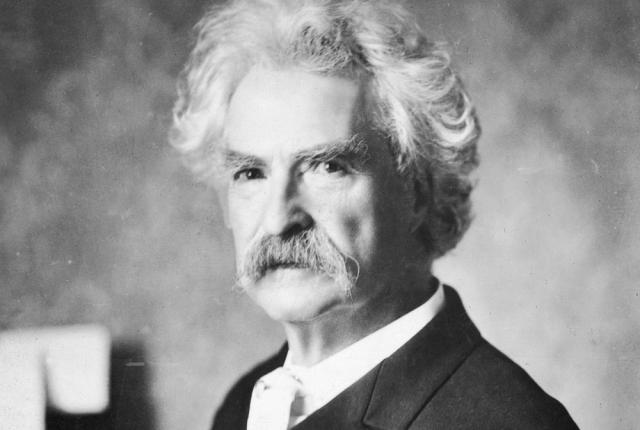
One day Mark Twain received a letter that contained only one word: “Pig.”
Without thinking twice, the writer published a response to this message in his newspaper: “I have to receive letters without a signature quite often. But yesterday for the first time they sent me a signature without a letter.”
***
Once, while at a social event, Mark Twain was talking with an unpleasant person. To smooth out the awkwardness, he decided to compliment her:
You are simply adorable today!
What the rude lady said:
I can't say the same about you.
Mark Twain was not at a loss:
But you can do like me! Lie!
Foot 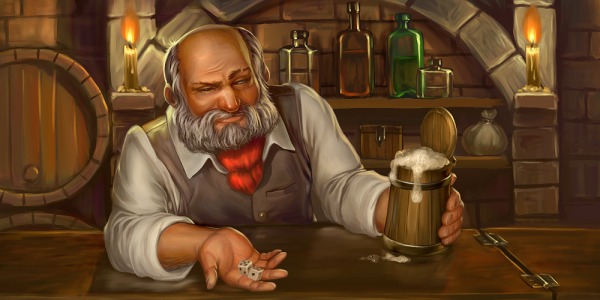
In 19th century Britain great fame used by an actor named Foote. Once, while traveling around the country, he stopped for the night in a small town.
Having ordered lunch for himself at the tavern, he ate it with pleasure and to the polite question of the innkeeper whether he liked the dinner, the actor, being in an excellent mood, replied:
Today I had the best lunch in England
With the exception of our mayor,” the innkeeper politely advised him.
Nonsense! I definitely had the best lunch ever!
“Except for the mayor,” the innkeeper said again.
The verbal altercation escalated into a conflict, and the innkeeper dragged the actor to that same mayor. The mayor, after listening to the innkeeper, informed Foote that in their city everyone was ordered to express every possible respect for the mayor and mention him at every opportunity. And violators of this order are promised either a fine or a day in prison. The actor immediately paid the fine and, outraged by the ridiculous story, said angrily:
I have never seen such a fool in my life as this innkeeper!
Except for the mayor, of course.
Alexander II 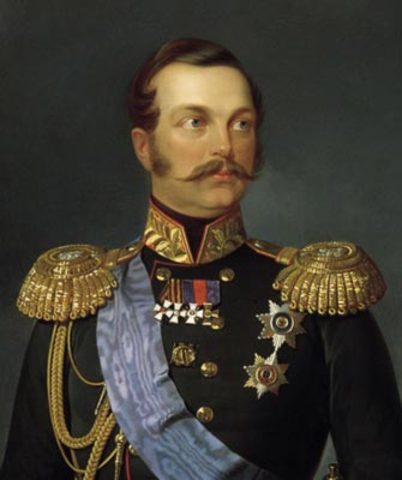
One landowner who received the title for his merits, and not from birth, and did not have noble birth, really wanted to send my son to study at the University. At that time, it was necessary to seek special permission to enter from the sovereign. And the landowner began to compose a message to the Tsar. Since he himself was an illiterate person, problems with composing the letter arose from the very beginning - he did not know how to contact the sovereign. Somewhere he had heard that high-ranking persons are called “the most august.” But the landowner did not know why exactly this was so. This happened in September, and the landowner decided that the most in the best possible way to address the sovereign at this time will be: “September sovereign...”.
The received message from Alexander II greatly amused him. He ruled:
Admit his son to the University and teach there so that he is not as illiterate as his father.
Socrates 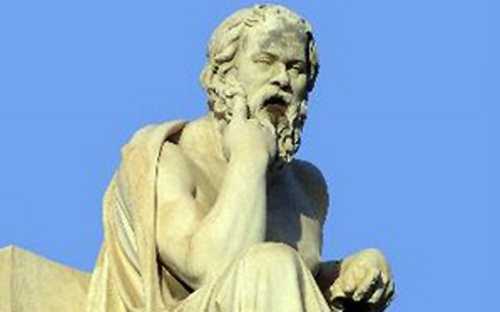
Walking speed
A passerby asked the philosopher Socrates:
- How many hours is it to the city?
Socrates replied:
- Go...
The traveler went, and when he had walked twenty steps, Socrates shouted:
- Two hours!
- Why didn’t you tell me right away? - he was indignant.
- How did I know how fast you would go!
Socratic calm
Few people can patiently endure being spoken ill of them in absentia. Socrates, great philosopher Athenian, listened with the greatest indifference as he was reviled behind his back.
“If they beat me in absentia,” the philosopher always said, “then I won’t say a word.”
Peter I 
Death prevented the award from being presented
Remember the lines of Pushkin's "Poltava": "...Where is Mazepa? Where is the villain? Where did Judas run in fear?" Comparing Mazepa with Judas, who was paid thirty pieces of silver for his betrayal, has a special meaning from a numismatic point of view.
Having learned about Mazepa’s betrayal, Peter I decided to “pay” the traitor with a kind of coin. This coin was specially made - weighing about 4 kg and with an appropriate inscription. According to Peter's plan, the notorious hetman, as a sign of his betrayal, was to wear a giant coin around his neck for the rest of his life. Only the death of Mazepa prevented the king from carrying out this plan.
Medal for drunkenness
Great Peter did not respect overly passionate drinkers. According to his decree, drunkards who ended up in prison were hung around their necks with a cast-iron medal weighing 17 pounds (about 7 kg) with the inscription “For drunkenness.”
Voltaire 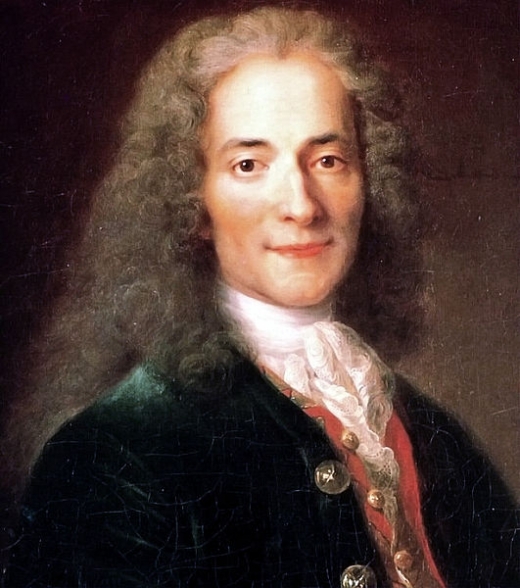
Philosopher and God
To a French writer and the philosopher Voltaire was asked what relationship he had with God, whether he was showing disrespect for God. He answered with dignity:
- Unfortunately, many have long noticed the opposite. I have been bowing to God for many years, but he has never responded to even one of my most polite bows.
Caution
When Voltaire was asked if he would undertake to write the history of his king, he answered sharply:
- Never! This would be the surest way to lose the royal pension.
Spectacular wit
One scientist, wanting to see Voltaire, made a special trip to Ferney, where he was very kindly received by the writer’s niece Madame Denis. However, Voltaire himself did not appear. Before leaving, the guest wrote to the owner: “I considered you a god and now I am finally convinced that I was right, since it is impossible to see you.”
Voltaire liked this joke so much that he ran after its author and kissed him.
Like chestnuts
Voltaire's books, which denounced the clergy, were subject to censorship persecution. The censors sentenced one of the books to be burned. Voltaire remarked in this regard:
- All the better! My books are like chestnuts: the more they are roasted, the more willingly people buy them.
Voltaire's friend
Voltaire had a doctor friend with whom he willingly spent evenings when he was healthy. But as soon as he got sick, he immediately wrote a note to the doctor: “Dear doctor! Please don’t come today: I’m sick.”
Voltaire's review
One young playwright asked Voltaire to listen to his new play. After reading his work to him, he eagerly awaited Voltaire's opinion.
“That’s it, young man,” said Voltaire after a long pause. “You can write such things when you become old and famous.” Until then, you need to write something better.
Haydn 
Oracle error
A young man appeared to the old Viennese bandmaster and, holding out an envelope with letter of recommendation from his first music teacher, he shyly asked to teach him counterpoint.
Having opened the envelope, the conductor read: “The giver of this is an empty dreamer who is obsessed with the fact that he can make a revolution in music. He has no talent at all, and he, of course, will not compose anything decent in his entire life. His name is Joseph Haydn".
Bull Minuet
Great Austrian composer Joseph Haydn, to his considerable surprise, once saw a guest in his house - a butcher, who turned out to be a lover and connoisseur of his works.
“Maestro,” the butcher respectfully took off his hat, “the other day is my daughter’s wedding.” Write me a new beautiful minuet. To whom should I turn with such an important request, if not to the famous Haydn?
A day later, the butcher received the composer’s precious gift, and a few days later he decided to thank him. Haydn heard deafening sounds, in which he hardly recognized the melody of his minuet. Approaching the window, he saw at his porch a magnificent bull with gilded horns, a happy butcher with his daughter and son-in-law, and a whole orchestra of traveling musicians. The butcher took a step forward and said with feeling:
- Sir, I think that the best expression The butcher's appreciation for a wonderful minuet can only be expressed by the best of his bulls.
Since then, this C major minuet by Haydn has been called the “Bull Minuet.”
Witty revenge
Haydn once conducted an orchestra in London. He knew that many English people sometimes go to concerts not so much for the pleasure of listening to music, but out of tradition. Some London regulars concert halls have acquired the habit of falling asleep in their comfortable chairs during performance. Haydn had to make sure that no exception was made for him. This circumstance greatly annoyed the composer, and he decided to take revenge on the indifferent listeners.
The revenge was witty. Haydn wrote a new symphony especially for Londoners.
At the most critical moment, when part of the audience began to nod off, a thunderous beat of a large drum was heard. And every time, as soon as the listeners calmed down and were ready to sleep again, a drumbeat was heard.
Since then, this symphony has been called “Symphony with Timpani Beats”, or “Surprise”.
Suvorov 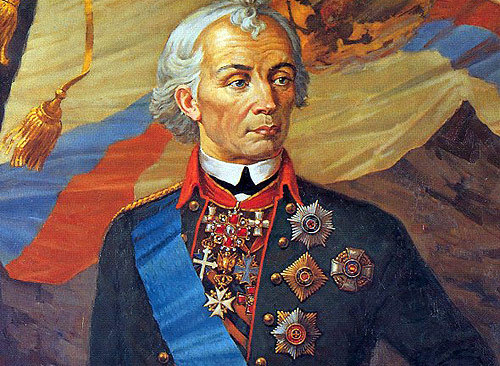
Eye meter
When they asked Alexander Vasilyevich Suvorov what an eye gauge is, great commander answered:
- Eye control - this means you need to climb a tree, survey the enemy camp and immediately congratulate yourself on your victory.
This is what he did at Rymnik.
What concerns anyone
The wife of one officer once complained to A.V. Suvorov about her husband:
- Your Grace, he treats me badly.
“It doesn’t concern me,” answered the commander.
- But he scolds you behind your back...
- And this, mother, does not concern you.
Towns
“Alexander Vasilyevich,” they asked Suvorov, “how do you evaluate the game of gorodki?”
“Playing small towns develops the eye, speed and pressure,” answered the commander. “I throw around with a bat—that’s the eye.” I hit with a bat - this is speed. I hit with a bat - this is an onslaught.
Mozart 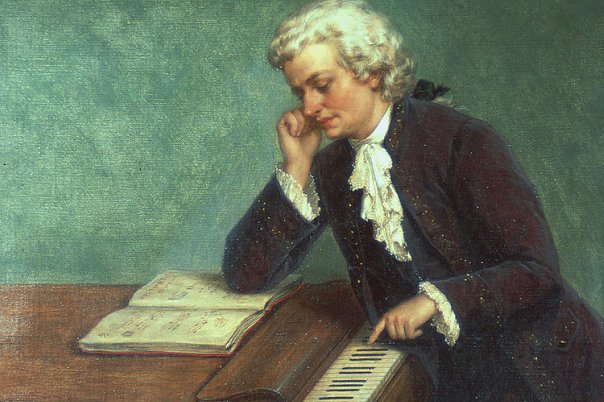
Grateful subject
Archduchess Marie Antoinette took little Mozart, the future composer, around Vienna Palace. The boy slipped on the parquet floor and fell. The Archduchess hurried to pick it up.
“You are very kind,” the young musician told her, “I will marry you.”
Marie Antoinette passed on Mozart's words to her mother.
- Why do you want to marry her highness? - asked the empress.
“Out of gratitude,” Mozart replied.
Immediacy
One day, a noble Salzburg dignitary decided to talk with young Mozart, which by that time had already acquired world fame. How to address the boy was what confused the nobleman. To say “you” to Mozart is inconvenient, his fame is too great, to say “you” is too much honor for a boy... But a way out has been found:
- We were in France and England? We had big success? - asked the dignitary.
- But, it seems, I have never met you anywhere except Salzburg! the simple-minded Wolfgang interrupted him.
How to do it
One young man asked Mozart how to write symphonies.
“You are still very young,” Mozart replied, “why don’t you start with ballads?”
- But you composed a symphony when you were only nine years old...
“That’s true,” Mozart agreed, “but I didn’t ask anyone how to do it.”
Not an ally to envious people
Haydn had many envious people among mediocre composers. One of them decided to recruit... Mozart as an ally. He invited the great composer to a concert in which Haydn's quartet was performed, and during the performance he said indignantly to Mozart.
- I would never write like that.
“Me too,” Mozart answered briskly, “and do you know why?” Neither you nor I would ever have thought of these lovely melodies.
For a long time, actors have been using one technique to better get into character before a performance. While changing in the dressing room, they completely undress and remain without clothes for several minutes. This helps them take a break from their worldly image and prepare for the role. The actor then puts on a suit and goes on stage.
1:1110 1:1120Once, before a performance, Faina Ranevskaya, practicing this method, stood in the dressing room in front of the mirror completely naked and smoked.
1:1349At that moment, the administrator rushed impulsively into the dressing room, apparently in order to say something important. But when he saw the “picture,” he froze on the threshold in silent amazement. Ranevskaya watched him through the mirror. Finally, after a pause, she asked:
1:1844Is it okay that I smoke?
1:38 1:48Mark Twain
1:102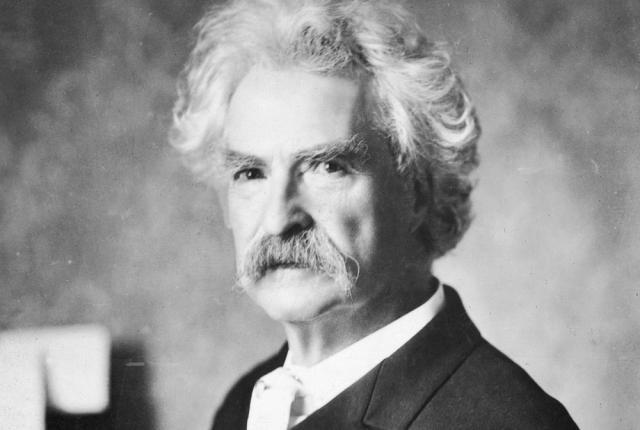
One day Mark Twain received a letter that contained only one word: “Pig.”
2:773 2:1130 2:1137Once, while at a social event, Mark Twain was talking with an unpleasant person. To smooth out the awkwardness, he decided to compliment her:
2:1397You are simply adorable today!
2:1463What the rude lady said:
2:1516I can't say the same about you.
2:58Mark Twain was not at a loss:
2:106But you can do like me! Lie!
2:176 2:186Foot
2:232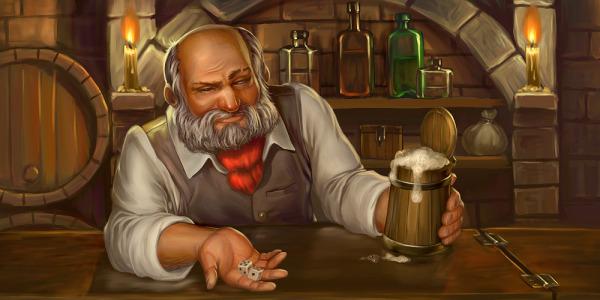
In the 19th century in Britain, an actor named Foote enjoyed great fame. Once, while traveling around the country, he stopped for the night in a small town.
3:1073Having ordered lunch for himself at the tavern, he ate it with pleasure and to the polite question of the innkeeper whether he liked the dinner, the actor, being in an excellent mood, replied:
3:1399Today I had the best lunch in England
3:1475With the exception of our mayor,” the innkeeper politely suggested to him.
3:1602Nonsense! I definitely had the best lunch ever!
3:70“Except for the mayor,” the innkeeper said again.
3:154The verbal altercation escalated into a conflict, and the innkeeper dragged the actor to that same mayor. The mayor, after listening to the innkeeper, informed Foote that in their city everyone was ordered to express every possible respect for the mayor and mention him at every opportunity. And violators of this order are promised either a fine or a day in prison. The actor immediately paid the fine and, outraged by the ridiculous story, said angrily:
3:880I have never seen such a fool in my life as this innkeeper!
3:980 3:1041Except for the mayor, of course.
3:1100 3:1110Alexander II
3:1167
One landowner, who received the title by merit, and not by birth, and did not have a noble origin, really wanted to send his son to study at the University. At that time, it was necessary to seek special permission to enter from the sovereign. And the landowner began to compose a message to the Tsar. Since he himself was an illiterate person, problems with composing the letter arose from the very beginning - he did not know how to contact the sovereign. Somewhere he had heard that high-ranking persons are called “the most august.” But the landowner did not know why exactly this was so. This happened in September, and the landowner decided that the best way to address the sovereign at this time would be: “September Sovereign...”.
4:1289The received message from Alexander II greatly amused him. He ruled:
4:1416Admit his son to the University and teach there so that he is not as illiterate as his father.
4:15844:9
Socrates
4:51
Walking speed
A passerby asked the philosopher Socrates:
- How many hours is it to the city?
Socrates replied:
- Go...
The traveler went, and when he had walked twenty steps, Socrates shouted:
- Two hours!
- Why didn’t you tell me right away? - he was indignant.
- How did I know how fast you would go!
Socratic calm
Few people can patiently endure being spoken ill of them in absentia. Socrates, the great Athenian philosopher, listened with the greatest indifference as he was reviled behind his back.
“If they beat me in absentia,” the philosopher always said, “then I won’t say a word.”
Peter I
5:47
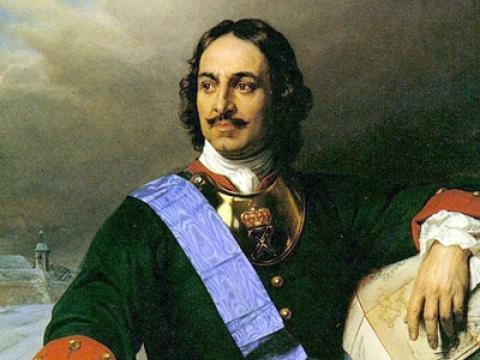
Death prevented the award from being presented
Remember the lines of Pushkin's "Poltava": "...Where is Mazepa? Where is the villain? Where did Judas run in fear?" Comparing Mazepa with Judas, who was paid thirty pieces of silver for his betrayal, has a special meaning from a numismatic point of view.
Having learned about Mazepa’s betrayal, Peter I decided to “pay” the traitor with a kind of coin. This coin was specially made - weighing about 4 kg and with an appropriate inscription. According to Peter's plan, the notorious hetman, as a sign of his betrayal, was to wear a giant coin around his neck for the rest of his life. Only the death of Mazepa prevented the king from carrying out this plan.
Medal for drunkenness
The Great Peter did not respect overly passionate drinkers. According to his decree, drunkards who ended up in prison were hung around their necks with a cast-iron medal weighing 17 pounds (about 7 kg) with the inscription “For drunkenness.”
Voltaire
6:470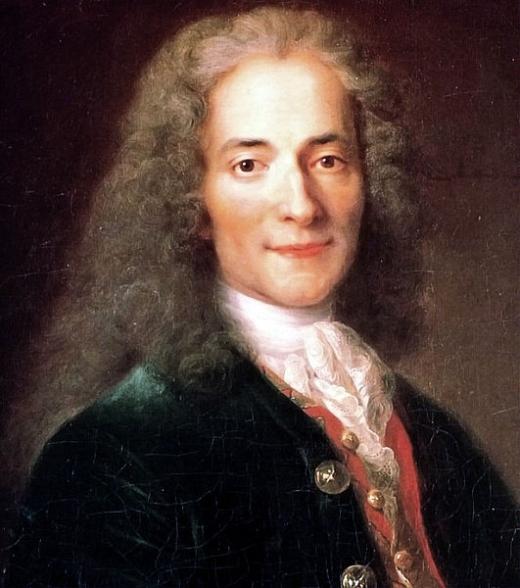
Philosopher and God
The French writer and philosopher Voltaire was asked what his relationship was with God, whether he was showing disrespect for God. He answered with dignity:
- Unfortunately, many have long noticed the opposite. I have been bowing to God for many years, but he has never responded to even one of my most polite bows.
7:9
Caution
When Voltaire was asked if he would undertake to write the history of his king, he answered sharply:
- Never! This would be the surest way to lose the royal pension.
Spectacular wit
One scientist, wanting to see Voltaire, made a special trip to Ferney, where he was very kindly received by the writer’s niece Madame Denis. However, Voltaire himself did not appear. Before leaving, the guest wrote to the owner: “I considered you a god and now I am finally convinced that I was right, since it is impossible to see you.”
Voltaire liked this joke so much that he ran after its author and kissed him.
Like chestnuts
Voltaire's books, which denounced the clergy, were subject to censorship persecution. The censors sentenced one of the books to be burned. Voltaire remarked in this regard:
- All the better! My books are like chestnuts: the more they are roasted, the more willingly people buy them.
7:9
Voltaire's friend
Voltaire had a doctor friend with whom he willingly spent evenings when he was healthy. But as soon as he got sick, he immediately wrote a note to the doctor: “Dear doctor! Please don’t come today: I’m sick.”
Voltaire's review
One young playwright asked Voltaire to listen to his new play. After reading his work to him, he eagerly awaited Voltaire's opinion.
“That’s it, young man,” said Voltaire after a long pause. “You can write such things when you become old and famous.” Until then, you need to write something better.
Haydn
7:1105
Oracle error
A young man came to the old Viennese conductor and, holding out an envelope with a letter of recommendation from his first music teacher, shyly asked to teach him counterpoint.
Having opened the envelope, the conductor read: “The bearer of this is an empty dreamer who is obsessed with the fact that he can make a revolution in music. He has no talent at all, and he, of course, will not compose anything decent in his entire life. His name is Joseph Haydn.” .
8:9
Bull Minuet
The great Austrian composer Joseph Haydn, to his great surprise, once saw a guest in his house - a butcher, who turned out to be a lover and connoisseur of his works.
“Maestro,” the butcher respectfully took off his hat, “the other day is my daughter’s wedding.” Write me a new beautiful minuet. To whom should I turn with such an important request, if not to the famous Haydn?
A day later, the butcher received the composer’s precious gift, and a few days later he decided to thank him. Haydn heard deafening sounds, in which he hardly recognized the melody of his minuet. Approaching the window, he saw at his porch a magnificent bull with gilded horns, a happy butcher with his daughter and son-in-law, and a whole orchestra of traveling musicians. The butcher took a step forward and said with feeling:
“Sir, I think that the best expression of gratitude for a wonderful minuet on the part of a butcher can only be the best of his bulls.”
Since then, this C major minuet by Haydn has been called the “Bull Minuet.”
8:9
Witty revenge
Haydn once conducted an orchestra in London. He knew that many English people sometimes go to concerts not so much for the pleasure of listening to music, but out of tradition. Some London concert hall patrons have acquired the habit of falling asleep in their comfortable chairs during performances. Haydn had to make sure that no exception was made for him. This circumstance greatly annoyed the composer, and he decided to take revenge on the indifferent listeners.
The revenge was witty. Haydn wrote a new symphony especially for Londoners.
At the most critical moment, when part of the audience began to nod off, a thunderous beat of a large drum was heard. And every time, as soon as the listeners calmed down and were ready to sleep again, a drumbeat was heard.
Since then, this symphony has been called “Symphony with Timpani Beats”, or “Surprise”.
8:9
Suvorov
8:53
Eye meter
When they asked Alexander Vasilyevich Suvorov what an eye gauge is, the great commander replied:
- Eye control - this means you need to climb a tree, survey the enemy camp and immediately congratulate yourself on your victory.
This is what he did at Rymnik.
What concerns anyone
The wife of one officer once complained to A.V. Suvorov about her husband:
- Your Grace, he treats me badly.
“It doesn’t concern me,” answered the commander.
- But he scolds you behind your back...
- And this, mother, does not concern you.
9:9
Towns
“Alexander Vasilyevich,” they asked Suvorov, “how do you evaluate the game of gorodki?”
“Playing small towns develops the eye, speed and pressure,” answered the commander. “I throw around with a bat—that’s the eye.” I hit with a bat - this is speed. I hit with a bat - this is an onslaught.
Mozart
9:504
Grateful subject
Archduchess Marie Antoinette took little Mozart, the future composer, around the Vienna palace. The boy slipped on the parquet floor and fell. The Archduchess hurried to pick it up.
“You are very kind,” the young musician told her, “I will marry you.”
Marie Antoinette passed on Mozart's words to her mother.
- Why do you want to marry her highness? - asked the empress.
“Out of gratitude,” Mozart replied.
10:9
Immediacy
One day, a noble Salzburg dignitary decided to talk with young Mozart, who by that time had already gained world fame. How to address the boy was what confused the nobleman. To say “you” to Mozart is inconvenient, his fame is too great, to say “you” is too much honor for a boy... But a way out has been found:
- We were in France and England? Were we a big success? - asked the dignitary.
- But, it seems, I have never met you anywhere except Salzburg! the simple-minded Wolfgang interrupted him.
How to do it
One young man asked Mozart how to write symphonies.
“You are still very young,” Mozart replied, “why don’t you start with ballads?”
- But you composed a symphony when you were only nine years old...
“That’s true,” Mozart agreed, “but I didn’t ask anyone how to do it.”
Not an ally to envious people
Haydn had many envious people among mediocre composers. One of them decided to recruit... Mozart as an ally. He invited the great composer to a concert in which Haydn's quartet was performed, and during the performance he said indignantly to Mozart.
- I would never write like that.
“Me too,” Mozart answered briskly, “and do you know why?” Neither you nor I would ever have thought of these lovely melodies.







